No products in the cart.
We deliver to:
🇦🇺 Australia
🇨🇦 Canada
🇨🇿 Czechia
🇩🇰 Denmark🇪🇪 Estonia
🇮🇪 Ireland
🇮🇱 Israel
🇮🇹 Italy
🇯🇵 Japan
🇲🇽 Mexico
🇵🇱 Poland
🇰🇷 South Korea
🇨🇭 Switzerland
🇬🇧 United Kingdom
🇺🇸 United States of Americaand more
We deliver to:
🇦🇺 Australia
🇨🇦 Canada
🇨🇿 Czechia
🇩🇰 Denmark🇪🇪 Estonia
🇮🇪 Ireland
🇮🇱 Israel
🇮🇹 Italy
🇯🇵 Japan
🇲🇽 Mexico
🇵🇱 Poland
🇰🇷 South Korea
🇨🇭 Switzerland
🇬🇧 United Kingdom
🇺🇸 United States of Americaand more
[category_image]
Almagel M lozenges with cherry flavor 24 pcs.
$21.24
Almagel M tablets reduce stomach acidity, relieve heartburn and pain, and are used in gastritis, ulcers, reflux, or hiatal hernia.
Category: Gastrointestinal tract and liver
Brand: Teva
Almagel M – a remedy for the treatment of acid-dependent diseases. Antacids.
Indications for use
Symptomatic therapy of digestive tract diseases accompanied by increased acidity of gastric juice, with or without heartburn, such as: peptic ulcer, gastritis, reflux esophagitis or hiatal hernia.
Composition
- active ingredient: 1 tablet contains 450 mg of aluminum hydroxide-magnesium carbonate gel dried, 300 mg of magnesium hydroxide;
- Excipients: lactose monohydrate, mannitol (E 421), pregelatinized starch, colloidal anhydrous silicon dioxide, croscarmellose sodium, cherry flavor, aspartame (E 951), magnesium stearate.
Contraindication
Hypersensitivity to magnesium and aluminum salts or to other components of the drug. Severe renal failure (acute and chronic), Alzheimer’s disease, hypophosphatemia, habitual constipation, chronic diarrhea, severe abdominal pain of unspecified origin.
Adverse reactions
Skin and subcutaneous tissue disorders: hypersensitivity reactions (urticaria, dermatitis, pruritus, angioedema and anaphylactic reactions).
On the part of the digestive tract: nausea, vomiting, diarrhea, constipation, change in stool color, abdominal pain.
Metabolism and nutrition: hypermagnesemia (observed after prolonged use of magnesium hydroxide in patients with impaired renal function), hyperaluminemia, hypophosphatemia.
Method of application
Adults and children over 12 years of age: 1–2 tablets 4–6 times daily (no more than 8 tablets per day, no longer than 6 days), unless otherwise prescribed by a doctor. Take the medicine approximately 1 hour after meals, and also in the evening before bedtime.
When treating heartburn, it is used in the same dosage regardless of meals.
Do not use the drug for more than 6 consecutive days without a doctor’s recommendation.
If symptoms occur periodically and there is a need for frequent use of the medication, you should consult a doctor.
Almagel® M tablets should be sucked slowly and in no case swallowed whole.
Application features
Use during pregnancy or breastfeeding
Due to the aluminum content (possible accumulation in the bones of the fetus), the use of combined antacids during pregnancy is allowed only as prescribed by a doctor, if the expected benefit to the mother outweighs the potential risk to the fetus/child.
Breastfeeding should be discontinued during treatment with the drug.
Children
Almagel® M is not recommended for use in children under 12 years of age. Children are recommended to use lower doses of the drug for a shorter period of treatment.
Ability to influence reaction speed when driving vehicles or other mechanisms
Does not affect.
Overdose
No cases of acute overdose have been recorded.
High doses may cause nausea, vomiting, decreased appetite, diarrhea, constipation, onset or exacerbation of mechanical and dynamic intestinal obstruction in patients at risk (see section “Special instructions”). With prolonged use of high doses, hypophosphatemia, hypocalcemia, hypercalciuria, muscle weakness, decreased tendon reflexes, increased fatigue, cardiac arrhythmias, osteomalacia, osteoporosis, hypermagnesemia, hyperaluminemia, encephalopathy, nephrocalcinosis may occur.
Symptoms of overdose also include facial flushing, exhaustion, muscle weakness, and inappropriate behavior.
Signs of metabolic alkalosis may also be observed: changes in mood or mental activity, numbness or pain in the muscles, nervousness and increased fatigue, slowed breathing, unpleasant taste sensations.
Long-term use of the drug Almagel® M can cause hypermagnesemia, despite the fact that the drug is almost not absorbed from the digestive tract.
If an overdose of the drug is suspected or if clinical signs appear, it is necessary to cancel the drug and take measures to quickly remove the drug from the gastrointestinal tract (administer activated charcoal, perform gastric lavage and other procedures to reduce the absorption of aluminum and magnesium ions).
Overdose should be treated symptomatically. Aluminum and magnesium are excreted in the urine; treatment of acute overdose consists of rehydration and forced diuresis. Intravenous calcium gluconate may be administered. In case of overdose in patients with impaired renal function, hemodialysis or peritoneal dialysis may be required.
Interaction with other medicinal products and other types of interactions
Almagel® M, like other antacids, interacts with some other orally administered drugs. On the one hand, it enhances the effect of levodopa, metoprolol and nalidixic acid. On the other hand, it reduces the effect of drugs taken simultaneously (there is a decrease in the amount of absorption from the gastrointestinal tract). Therefore, it is generally recommended not to take other drugs simultaneously with antacids or to take them at least 1 hour before or after taking antacids. Antacids containing aluminum compounds form insoluble complexes with phosphates and can cause phosphate depletion.
Should be taken 2 hours before or 2 hours after taking the drug (4 hours for fluoroquinolone and chloroquine): acetylsalicylic acid, H2-histamine receptor blockers, anti-tuberculosis drugs (ethambutol, isoniazid for oral use), rifampicin, tetracycline antibiotics, atenolol, metoprolol, propranolol, chloroquine, cyclines, rosuvastatin, diflunisal, cardiac glycosides (e.g. digoxin), diphosphonates, fluorine, vitamins, fexofenadine, iron (salts), fluoroquinolones (e.g. ciprofloxacin, ofloxacin), sodium fluoride, glucocorticoid drugs (interaction with prednisolone and dexamethasone has been described), indomethacin, naproxen, kaeksalate, ketoconazole, lansoprazole, lincosamides, phenothiazine neuroleptics (e.g. chlorpromazine), penicillamine, phosphorus (supplements), thyroxine.
When used simultaneously with salicylates, the excretion of salicylates by the kidneys is increased due to alkalization of the urine.
The drug should not be used simultaneously with quinolines.
Quinidine excretion may be impaired with manifestations of quinidine toxicity, especially in patients with renal insufficiency.
Simultaneous use with cholinergic agents reduces their effectiveness.
Concomitant use of aluminum hydroxide and citrates may lead to increased aluminum levels, especially in patients with renal insufficiency.
The use of the drug together with enteric-coated drugs may lead to more rapid dissolution of the coating and irritation of the stomach and duodenum.
The drug may reduce the absorption of folic acid.
When used in combination with levothyroxine, its hormonal action may be reduced. Pirenzepine enhances and prolongs the effect of the drug Almagel® M.
Storage conditions
Store at a temperature not exceeding 25 ° C. Keep out of the reach of children.
Be the first to review “Almagel M lozenges with cherry flavor 24 pcs.” Cancel reply
You may also like


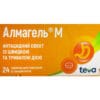
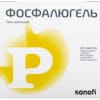
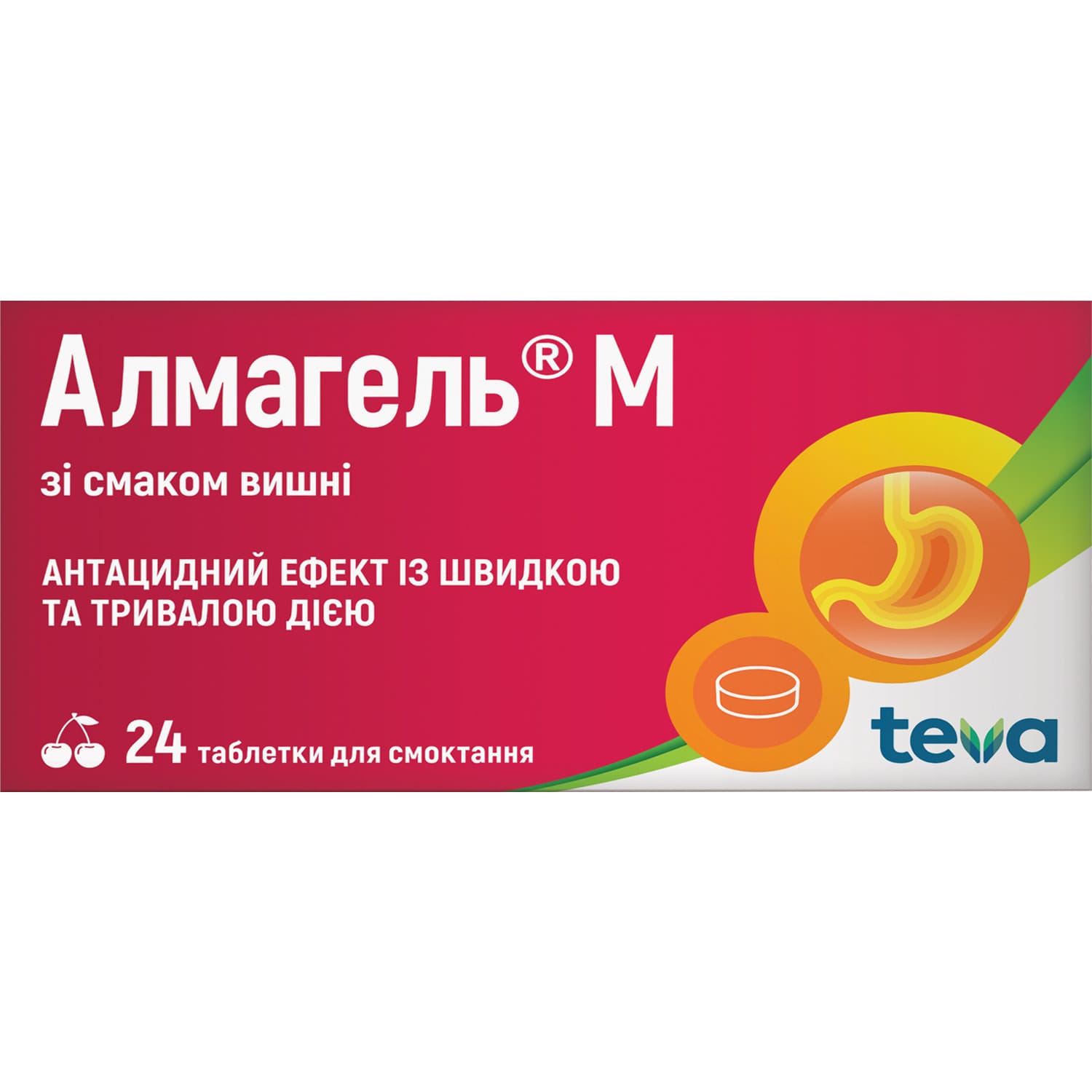
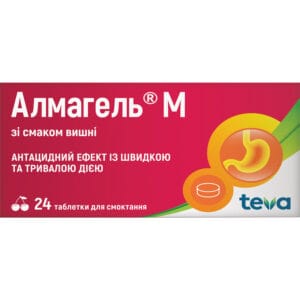
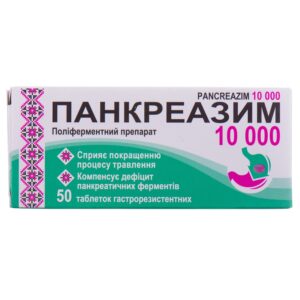
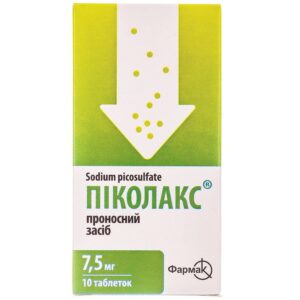
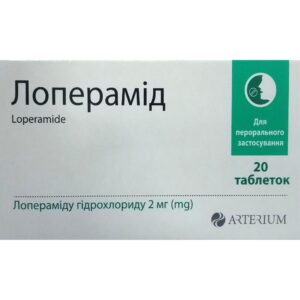
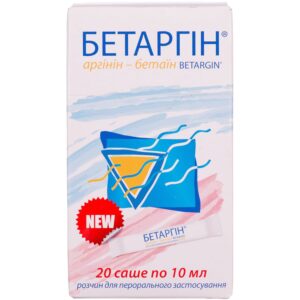
Reviews
There are no reviews yet.